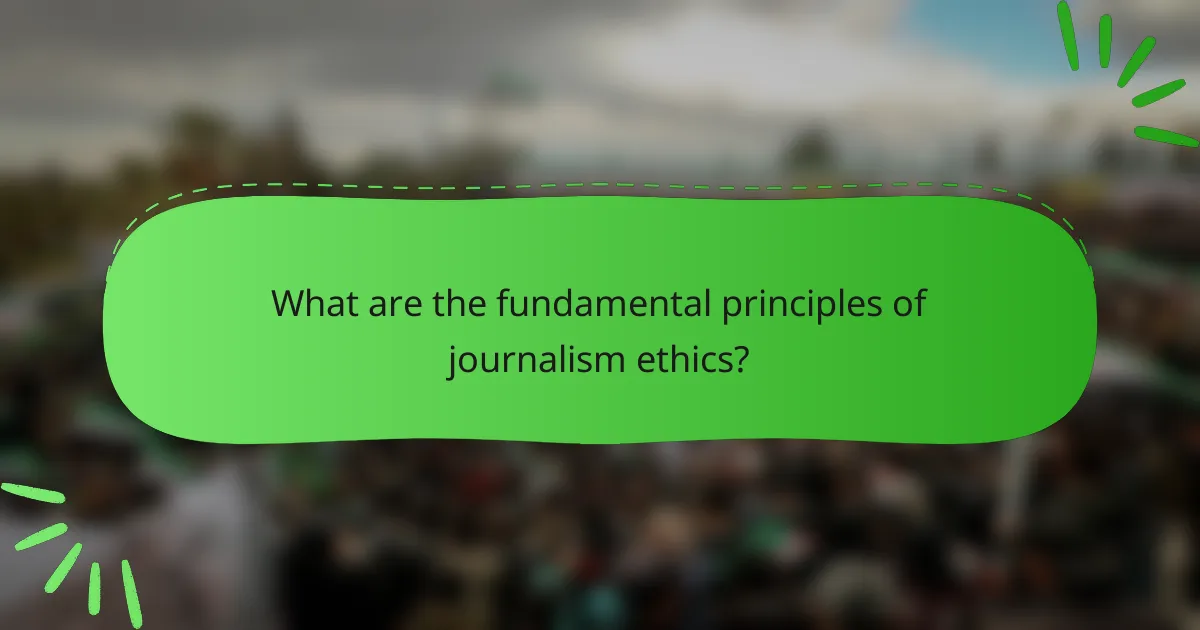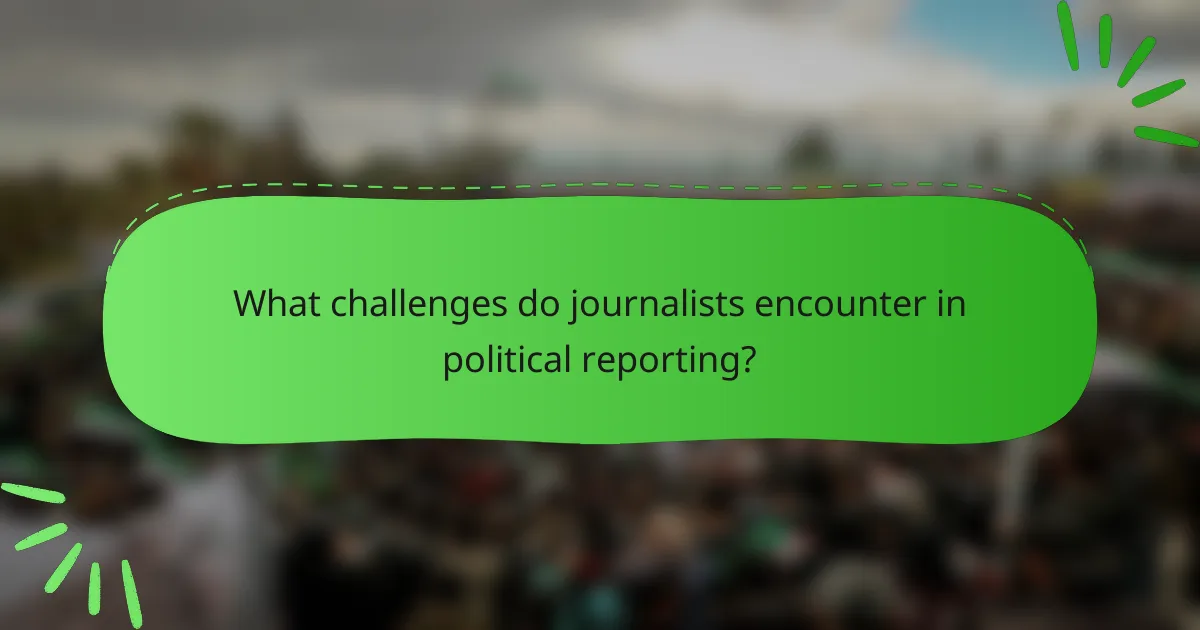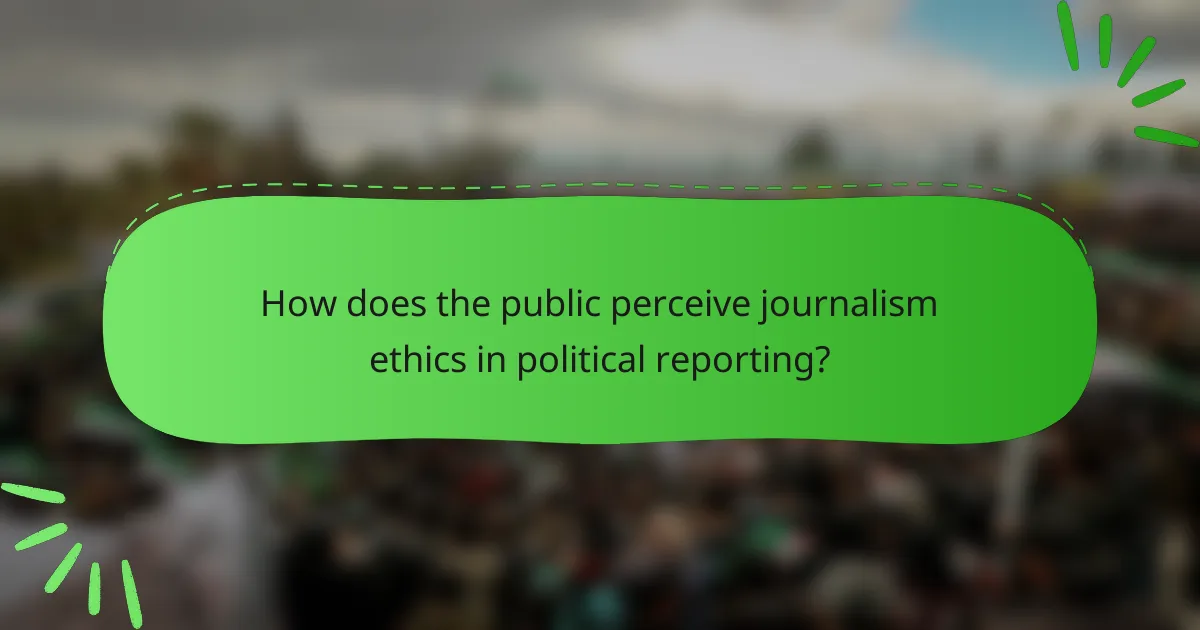The article examines the intersection of journalism ethics and political reporting in the United States, focusing on fundamental principles such as truthfulness, accuracy, fairness, and accountability. It highlights the challenges journalists face, including pressure to maintain objectivity, rapid news cycles, limited access to reliable sources, threats to safety, and the prevalence of misinformation. Additionally, the article discusses public perceptions of journalism ethics, revealing widespread concerns about bias and the integrity of political reporting. The findings underscore a growing demand for accountability and transparency in the media landscape.

What are the fundamental principles of journalism ethics?
The fundamental principles of journalism ethics include truthfulness, accuracy, fairness, and accountability. Truthfulness requires journalists to report facts honestly and without distortion. Accuracy emphasizes the importance of verifying information before publication. Fairness involves presenting all sides of a story to provide a balanced perspective. Accountability holds journalists responsible for their work and its impact on society. These principles are essential for maintaining public trust in journalism. They guide journalists in their pursuit of ethical reporting, particularly in political contexts where misinformation can have significant consequences.
How do these principles apply to political reporting?
Journalism ethics principles apply to political reporting by ensuring accuracy, fairness, and transparency. These principles guide journalists in their coverage of political events and figures. Accuracy requires verifying facts before publication. Fairness involves presenting multiple viewpoints without bias. Transparency demands disclosing sources and potential conflicts of interest. For instance, the Society of Professional Journalists emphasizes these ethical standards in their code of ethics. Adhering to these principles fosters public trust in political journalism. This trust is essential for a functioning democracy, as informed citizens rely on accurate reporting to make decisions.
What ethical dilemmas do journalists face in political reporting?
Journalists face several ethical dilemmas in political reporting. One major dilemma is the balance between reporting the truth and protecting sources. Journalists must decide whether to reveal confidential information that could harm their sources or the public interest. Another dilemma involves bias. Journalists are expected to remain impartial, yet personal beliefs can unconsciously influence reporting. The challenge of verifying information is also significant. In the fast-paced political environment, journalists may struggle to confirm facts before publication, leading to the risk of spreading misinformation.
Additionally, the pressure to attract readership can lead to sensationalism. This compromises journalistic integrity and can distort public perception. Conflicts of interest present another ethical challenge. Journalists must avoid situations where personal relationships or financial interests could influence their reporting. Finally, the use of anonymous sources raises ethical questions about accountability and transparency. These dilemmas highlight the complexities journalists navigate in maintaining ethical standards while informing the public.
How can journalists maintain integrity while reporting on politics?
Journalists can maintain integrity while reporting on politics by adhering to ethical standards and factual accuracy. They should verify information from multiple reliable sources before publication. Transparency in sourcing builds trust with the audience. Journalists must avoid conflicts of interest that could compromise their objectivity. They should also disclose any potential biases or affiliations that may influence their reporting. Following established codes of ethics, such as those from the Society of Professional Journalists, reinforces their commitment to integrity. Continuous education on ethical practices is essential for adapting to new challenges in political reporting.
Why is transparency important in political journalism?
Transparency is crucial in political journalism because it builds trust between journalists and the public. Trust enhances the credibility of news organizations. When journalists disclose their sources and methods, it allows audiences to evaluate the reliability of the information. A 2020 Pew Research study found that 53% of Americans believe that transparency in reporting improves public confidence in the media. Furthermore, transparency helps hold politicians accountable by exposing biases or conflicts of interest. This accountability is essential for a functioning democracy. Without transparency, misinformation can spread unchecked, undermining informed public discourse.
What role does transparency play in building public trust?
Transparency is crucial in building public trust. It allows citizens to understand the decision-making processes of institutions. When organizations are open about their actions, it fosters accountability. This accountability can lead to increased confidence among the public. Studies show that transparency reduces misinformation. For example, a 2018 survey by the Pew Research Center found that 73% of Americans believe transparency is essential for trust in media. Therefore, effective communication and openness enhance credibility.
How can journalists effectively communicate their sources and methods?
Journalists can effectively communicate their sources and methods by being transparent and clear about their research process. They should identify and attribute sources explicitly in their reporting. This includes naming individuals or organizations that provided information. Journalists should also explain the context in which the information was gathered. Providing details about the methods used to obtain information enhances credibility. For instance, citing interviews, documents, or data sources helps readers understand the basis of the reporting. Additionally, journalists can use footnotes or hyperlinks to direct readers to original sources. This practice fosters trust and accountability in journalism. Transparency in sourcing is crucial for ethical reporting, especially in political contexts.

What challenges do journalists encounter in political reporting?
Journalists encounter several challenges in political reporting. One significant challenge is the pressure to maintain objectivity. Political biases can influence reporting, leading to skewed narratives. Another challenge is the rapid pace of news cycles. Journalists must quickly verify facts, which can lead to errors. Access to reliable sources is often limited. Politicians may provide selective information or deny interviews. Additionally, journalists face threats to their safety. In some regions, political reporting can lead to harassment or violence against reporters. Misinformation is also a major issue. The spread of false information complicates accurate reporting. These challenges impact the integrity of political journalism.
How does bias influence political journalism?
Bias significantly influences political journalism by shaping the framing of news stories. Journalists’ personal beliefs and affiliations can lead to selective reporting. This can manifest in choosing which facts to highlight or downplay. Consequently, audiences may receive a skewed perception of political events. Research indicates that biased reporting can reinforce existing political opinions among readers. A study by the Pew Research Center found that individuals often seek out news sources that align with their views. This creates an echo chamber effect, where bias perpetuates itself. Ultimately, bias in political journalism can undermine the objectivity essential for informed public discourse.
What are common sources of bias in political reporting?
Common sources of bias in political reporting include political affiliation, framing, and selective reporting. Political affiliation influences journalists’ perspectives and the narratives they choose to promote. For instance, studies show that reporters from liberal backgrounds often emphasize progressive viewpoints. Framing involves presenting information in a way that highlights certain aspects while downplaying others. This can shape public perception significantly. Selective reporting occurs when news outlets prioritize specific stories that align with their agenda, leading to an incomplete portrayal of events. Research indicates that this can create echo chambers, reinforcing existing beliefs among audiences.
How can journalists mitigate bias in their reporting?
Journalists can mitigate bias in their reporting by employing strategies such as fact-checking, diversifying sources, and adhering to ethical guidelines. Fact-checking involves verifying information before publication to ensure accuracy. Diversifying sources includes seeking perspectives from various stakeholders to present a balanced view. Adhering to ethical guidelines, like those outlined by the Society of Professional Journalists, promotes accountability and transparency. Research indicates that diverse newsrooms produce more balanced reporting, as evidenced by a 2019 study from the American Society of News Editors. This study found that news organizations with diverse teams are less likely to exhibit bias in their coverage. By implementing these strategies, journalists can enhance the integrity of their reporting and foster public trust.
What impact does misinformation have on political journalism?
Misinformation significantly undermines political journalism. It distorts public perception and erodes trust in media. Journalists face challenges in verifying facts amidst an overwhelming volume of false information. This leads to a cycle of sensationalism, where outlets prioritize speed over accuracy. A 2020 study by the Pew Research Center found that 55% of Americans believe misinformation causes confusion about basic facts. Consequently, political polarization increases as people gravitate toward sources that confirm their biases. The integrity of political discourse is compromised when misinformation prevails. Ultimately, misinformation threatens the foundational principles of informed democracy.
How can journalists combat misinformation in their reporting?
Journalists can combat misinformation by verifying facts before publication. They should cross-check information against credible sources. Utilizing fact-checking organizations enhances accuracy. Engaging in thorough research builds a solid foundation. Journalists must maintain transparency about their sources. Clearly indicating when information is unverified helps manage audience expectations. Educating the public on identifying misinformation is essential. Studies show that informed audiences are less susceptible to falsehoods.
What strategies are effective in fact-checking political claims?
Effective strategies for fact-checking political claims include verifying sources, cross-referencing information, and using fact-checking organizations. Verifying sources involves checking the credibility of the individuals or entities making the claims. Cross-referencing information means comparing the claim against multiple reputable sources for consistency. Fact-checking organizations, such as PolitiFact and FactCheck.org, provide researched analyses of political statements. These organizations often cite original documents and data to support their findings. Additionally, employing tools like reverse image searches can help verify the authenticity of visual content. Using these strategies enhances the reliability of information in political reporting.

How does the public perceive journalism ethics in political reporting?
The public perceives journalism ethics in political reporting as increasingly compromised. Many individuals believe that bias influences news coverage. A 2021 Pew Research Center study found that 71% of Americans think news organizations favor one side. This perception undermines trust in the media. Additionally, 68% of respondents expressed concern about misinformation in political reporting. These statistics highlight a growing skepticism towards journalistic integrity. The public often calls for more accountability and transparency from journalists. Overall, the perception of ethics in political journalism is marked by distrust and demands for improvement.
What factors contribute to public trust in political journalism?
Public trust in political journalism is influenced by several key factors. Accuracy in reporting builds credibility among audiences. Transparency about sources and methodologies fosters trustworthiness. Ethical standards upheld by journalists enhance the perceived integrity of news organizations. Consistent and fair coverage of political events helps maintain audience confidence. Engagement with the public through feedback mechanisms strengthens relationships. Research indicates that trust in media correlates with the perceived independence from political influence. According to the Pew Research Center, 63% of Americans believe that news organizations are biased, which can diminish trust.
How do media literacy and education affect public perception?
Media literacy and education significantly shape public perception. They equip individuals with critical thinking skills. This enables people to analyze and evaluate media messages effectively. Research indicates that higher media literacy correlates with more informed opinions. For instance, a study by the Pew Research Center found that media-savvy individuals are less likely to believe misinformation. Education fosters an understanding of media bias and influence. This awareness helps individuals discern credible sources from unreliable ones. Consequently, an educated public is more likely to engage in informed discussions. This ultimately leads to a more democratic society.
What role does social media play in shaping public trust?
Social media significantly influences public trust by facilitating direct communication between citizens and information sources. It allows individuals to engage with news content and share opinions rapidly. This immediacy can enhance transparency but also lead to misinformation. Studies show that trust in news is affected by social media interactions. For instance, a Pew Research Center report indicates that 53% of Americans say they often encounter conflicting information on social media. This conflict can erode trust in traditional media outlets. Additionally, social media algorithms can create echo chambers, reinforcing existing beliefs and diminishing exposure to diverse perspectives. Overall, social media shapes public trust through its role in information dissemination and community engagement.
What best practices can journalists adopt in political reporting?
Journalists can adopt several best practices in political reporting to enhance accuracy and credibility. First, they should verify information through multiple reliable sources. This helps ensure the facts presented are accurate and trustworthy. Second, journalists must maintain objectivity by avoiding personal biases in their reporting. This allows for balanced coverage of political events. Third, they should disclose conflicts of interest to maintain transparency with their audience. Fourth, using clear and precise language is essential to avoid misinterpretation of political issues. Furthermore, journalists should fact-check statements made by political figures, especially during campaigns. This practice helps hold public officials accountable for their words. Lastly, engaging with diverse perspectives can enrich political reporting and provide a fuller picture of issues. These practices collectively contribute to ethical and responsible political journalism.
How can journalists ensure fairness and accuracy in their work?
Journalists can ensure fairness and accuracy in their work by adhering to ethical standards and rigorous fact-checking processes. They should verify information from multiple credible sources before publication. This practice helps to prevent the spread of misinformation. Journalists must strive for balanced reporting by including diverse perspectives. This approach ensures that all sides of a story are represented. Furthermore, transparency about sources and methods enhances credibility. According to the Society of Professional Journalists, ethical journalism promotes accountability and public trust. By following these principles, journalists can uphold the integrity of their reporting.
What resources are available for journalists to enhance their ethical practices?
Resources available for journalists to enhance their ethical practices include professional organizations, guidelines, and training programs. The Society of Professional Journalists (SPJ) offers a Code of Ethics that serves as a foundational resource. The American Press Institute provides various training materials focused on ethical reporting. Additionally, the Online News Association offers workshops and resources on digital journalism ethics. Universities often have journalism programs that include ethics courses and seminars. These resources help journalists navigate complex ethical dilemmas in political reporting.
What are the future trends in journalism ethics and political reporting?
Future trends in journalism ethics and political reporting include increased transparency, accountability, and the use of technology. Journalists are prioritizing fact-checking to combat misinformation. The rise of social media platforms is pushing for ethical guidelines in content sharing. Collaborative journalism is becoming more prevalent, fostering partnerships among news organizations. Diversity and inclusion are critical focuses to ensure varied perspectives in reporting. Artificial intelligence is being integrated to enhance reporting accuracy and efficiency. Additionally, audience engagement is shifting towards participatory journalism, where readers contribute to the news process. These trends reflect the evolving landscape of journalism and the need for ethical standards in political reporting.
How might technology influence ethical standards in political journalism?
Technology can significantly influence ethical standards in political journalism by altering how information is gathered, disseminated, and consumed. The rise of digital platforms allows for rapid news distribution, which can lead to the prioritization of speed over accuracy. This shift often pressures journalists to verify information quickly, potentially compromising ethical standards.
Social media algorithms can amplify sensationalist content, affecting public perception and trust in journalism. This creates a challenge for journalists to maintain objectivity and integrity in their reporting. Furthermore, the availability of data analytics tools enables journalists to investigate political issues more deeply, fostering transparency and accountability.
However, reliance on technology can also lead to ethical dilemmas regarding privacy and data security. Journalists may face conflicts between the public’s right to know and individuals’ right to privacy. The accessibility of information can blur the lines between factual reporting and opinion, complicating ethical standards.
In summary, technology shapes ethical standards in political journalism by influencing information accuracy, public perception, and the balance between transparency and privacy.
What emerging challenges should journalists be prepared for in political reporting?
Journalists should be prepared for challenges such as misinformation, polarization, and evolving technology in political reporting. Misinformation has surged, especially on social media platforms. A 2020 study by the Pew Research Center found that 53% of Americans say they frequently encounter false information online. Polarization is increasing, leading to biased reporting and audience fragmentation. A 2021 report from the Knight Foundation indicated that 70% of Americans believe news organizations are politically biased. Additionally, the rise of artificial intelligence is changing how news is produced and consumed. Journalists must adapt to these technological advancements to maintain credibility and accuracy.
The main entity of the article is journalism ethics, particularly in the context of political reporting in the US. The article outlines the fundamental principles of journalism ethics, including truthfulness, accuracy, fairness, and accountability, and their application in political journalism. It examines ethical dilemmas journalists face, the importance of transparency in building public trust, and the impact of misinformation on political discourse. Additionally, the article discusses strategies for maintaining integrity, mitigating bias, and the role of technology in shaping ethical standards, while highlighting emerging challenges in the evolving landscape of political reporting.